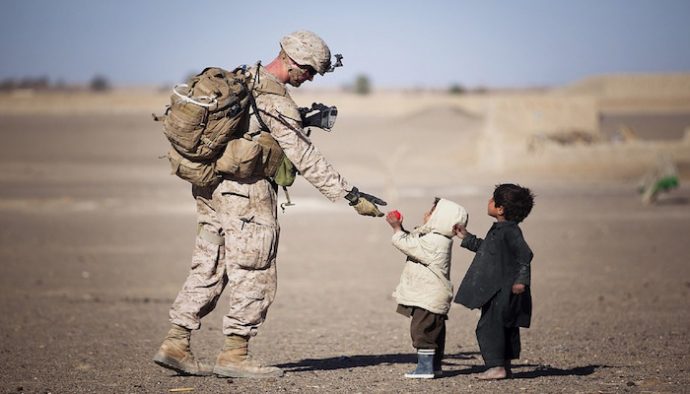How do you describe the Christian life? What metaphor do you use to help yourself and others understand what it means to follow Jesus?
For Paul, that answer depended on the occasion he was issuing a description. You find the apostle deploying various metaphors to describe the Christian life, and in 2 Timothy 2, you find not one metaphor, but three. In those verses, Paul likens the Christian to the athlete, the farmer, and the soldier. And all three metaphors are very applicable.
But in regard to the soldier in particular, Paul wrote this: “No one serving as a soldier gets entangled in the concerns of civilian life; he seeks to please the recruiter” (2 Tim. 2:4). Like the soldier, the Christian has a different – but clear – set of priorities. Because those priorities are so clear for the soldier, they must not get tangled up in the same things that might concern the civilian. The Christian, then, must understand that he too has a different set of priorities, and because he does, he must also be aware of not getting tangled up in things that don’t relate to those priorities.
Now I myself am many things: I am an employee. I am a church member. I am a husband. And I am a father. If as a Christian I am like a soldier, then I think it would do me some good to take that metaphor and apply it across these roles I carry in life. And that causes me to ask the question in regard to my parenting – how might I parent like a soldier? The simple answer is given to us in the text – we parent like soldiers by not getting entangled in civilian life. That is a great challenge for me as a parent, because there are all kinds of ways, in my parenting, that I might get entangled in the civilian life. If I do, I will fight the wrong battles, seek to achieve the wrong victories, and focus on the wrong issues.
To parent like a soldier, though, is to be focused on what is truly important and to have the discipline to put your energy to that end. Practically, then, I think parenting like a soldier, or parenting by not getting entangled in civilian life, means at least three things:
1. Connecting the small to the big.
There are so many battles we have to fight as parents. We have to fight battles involving food, technology, activity level, homework, making the bed, and a host of others. Many of these are worthy battles, but they are not the ultimate battle. It’s important for us as parents to know what the big battle is all about, and do what we can to connect these smaller battles to the one that really matters.
For example, we might engage in the technology battle with our kids. They might want more time than we are comfortable with in front of the TV or playing video games, so we have to choose whether we are going to fight to stand our ground or give into their desires. When we choose to stand our ground, we also have an opportunity to connect the battle we are fighting to the greater battle. We might, then, choose to say something to our children like, “The reason you cannot play video games all afternoon is not only because we don’t think it’s a good use of your time; it’s because you have been made in the image of God. And that means God has given you an imagination. So it’s not that we are anti-video games; it’s that we want to see you exercise and steward the gift of the imagination God has given you.”
Now if you’re a parent, you know that statements like go over like a lead balloon most of the time. I’ve never had the experience when one of my children suddenly drops their request and says, “Yes, father. I agree. Thank you for fighting the battle for my imagination like this.” But there is power in repetition. And just because they don’t acknowledge what you’re doing doesn’t mean there is no lasting value in saying it over and over again.
2. Shaping the heart, not only the behavior.
Another way we, as parents, do not get involved in civilian affairs is that we are constantly working to shape the heart instead of only shaping the behavior. Civilian life is all about behavior – it’s about developing the proper behavior to make you a successful and popular citizen of society. But as parents seeking to raise our children in the admonition of the Lord, it’s our responsibility to focus on the heart and not only the behavior. How do we do this?
All sorts of ways really, but one of the most practical ones is through the way we discipline. Instead of simply handing down punishments when our kids break the rules, we can choose to try and engage them at a deeper level. Sure, it was wrong they took that toy from their sibling. But what was happening in their heart? Was it jealousy? Was it a lack of gratitude for what they already had? Taking the time to through these issues at a heart level is one simple way we can emphasize that we are more concerned about the heart that ultimately needs the gospel of Jesus more than the behavior that needs a simple correction.
3. Protecting the home as a safe place.
One final way we can not involve ourselves in civilian affairs involves the overall culture of our homes. Our homes should be a safe place for our children – a place where they know, no matter what else happens, they will experience something akin to the kingdom of God. That doesn’t mean our homes won’t be filled with discipline, but it does mean they will be filled with grace and mercy and love. It means that even though the world might tell them they are too fat, too dumb, too awkward, too unpopular, too unathletic, or too whatever, that at home they are deeply known and deeply loved. When our homes communicate the same things as the rest of the world then our homes become just another environment that is concerned with civilian affairs.
Christian, parent like a soldier. Don’t get involved in civilian affairs, for as soldiers, we know that there are deeper and more important battles to be fought and won.
Subscribe to MichaelKelley.co
Never miss a new post. Subscribe to receive these posts in your inbox and to receive information about new discipleship resources.




